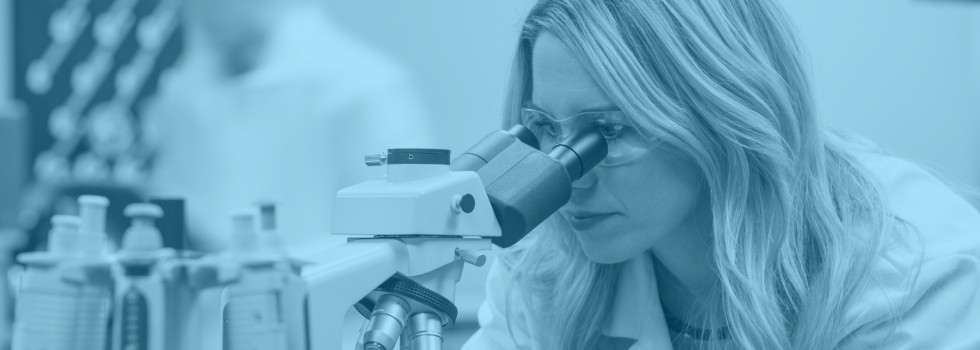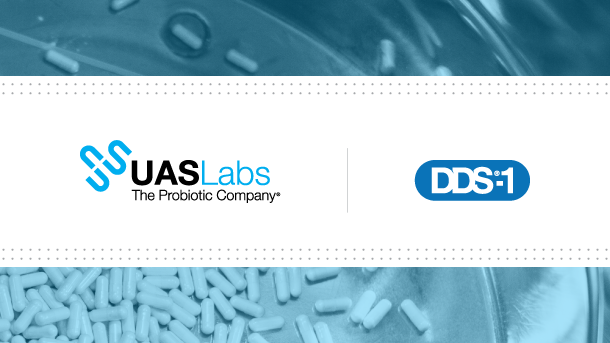UAS Labs has been at the forefront of probiotic research for almost 40 years. Since opening its doors in 1979, the pure-play probiotic specialist has developed a series of strains that have moved the field beyond its roots and into the emerging era of condition-specific products. In doing so, UAS Labs has redefined what it means to do high-quality probiotic research by putting its strains through rigorous clinical trials.
The story of UAS Labs can be told in multiple ways. One version of the story would focus on the infrastructure investments UAS Labs has made to enable the development and production of quality probiotics. These investments date back to the early days of the company and continue to this day, with its recent $60 million outlay on fermentation and freeze-drying capacity a notable example.
UAS Labs’ story can also been seen through its three probiotic superstrains: Lactobacillus acidophilus DDS-1, Lactobacillus reuteri NCIMB 30242 LRC and Lactobacillus gasseri BNR17. These strains tell the story of UAS Labs’ willingness to invest in research that shows, for better or worse, the true effects of its probiotics. That willingness has seen UAS Labs test its strains in a series of randomized controlled clinical trials that rigorously assessed their efficacy against predefined endpoints.
DDS-1: A long-researched strain
The story of UAS Labs’ legacy of research starts with DDS-1, a strain that Dr. Khem Shahani discovered after he began researching L. acidophilus in the late 1950s. DDS-1 stood out because of its superior growth, stability and health-promoting properties, encouraging Shahani and later UAS Labs to test the strain in a series of clinical trials. Several decades and around 30 peer-reviewed publications later, DDS-1 is established as one of the most comprehensively studied probiotic strains.
Highlights of the extensive research into DDS-1 include two pediatric clinical trials. One of the trials compared DDS-1 to placebo in 90 preschool children with moderate-to-severe atopic dermatitis. After eight weeks, subjects in the DDS-1 arm had improved by 34% on a symptom score, resulting in the trial hitting its primary endpoint. DDS-1 outperformed placebo against secondary endpoints, too.
The second trial gave DDS-1, plus Bifidobacterium lactis UABLA-12, or placebo to 240 children when a member of their household fell ill. Children who received the probiotics recovered faster from acute respiratory infection than their counterparts in the placebo cohort. The difference was statistically significant.
DDS-1 is the subject of notable clinical trials in adults, too. One of the many successful adult trials of DDS-1 enrolled healthy volunteers who complained of lactose intolerance. Eligible participants were randomized to take to DDS-1 or placebo for four weeks followed by a two-week washout period. At the end of the washout period, the participants switched to the other arm of the trial.
The study linked consumption of DDS-1 to statistically-significant reductions in diarrhea, abdominal cramping and vomiting symptom scores. DDS-1 also bested placebo on the overall symptom score.
These three trials are just a snapshot of the research into DDS-1, which has been evaluated for use as both a single strain and a blend in women’s health, immune health, digestive health and other areas. Despite that legacy of research, UAS Labs continues to see opportunities to invest in DDS-1. In 2018, UAS Labs bought Nebraska Cultures to become the exclusive supplier of DDS-1 and it continues to support clinical trials of the strain on multiple continents.
LRC: Entering the condition-specific era
While DDS-1 is the defining strain of the first three decades of UAS Labs, LRC is synonymous with the evolution of the company since it changed ownership in 2013. Under the leadership of CEO Kevin Mehring and CSO Dr Greg Leyer, UAS Labs identified LRC as the strain to spearhead its efforts to move the company — and industry as a whole — into an era of condition-specific probiotics backed up by data from gold-standard clinical trials.
UAS Labs’ belief in the potential of the strain stemmed from the work performed by Micropharma, the company that discovered it and took it through early development. Micropharma set out to find a strain with elevated activity of bile salt hydrolase — an enzyme involved in cholesterol metabolism — by screening more than 100 potential candidates. LRC emerged as the most promising prospect.
After optimizing LRC to further increase production of the enzyme, Micropharma started to build a comprehensive data package demonstrating the efficacy of the strain. The strength of the data and rigorousness of the science behind it attracted UAS Labs, which acquired Micropharma in 2014 and continued to invest in research into the effects of LRC.
These efforts have created a body of evidence of rare breadth and depth. The core of the supporting data comes from two randomized controlled clinical trials, which compared LRC to placebo in more than 240 subjects. The trials, which assessed LRC in yogurt and capsule forms, found the low-density lipoprotein (LDL) cholesterol levels of subjects who received the probiotic were supported at healthy levels. Both trials also linked the strain to healthy levels of other biomarkers of cardiovascular health, including apolipoprotein B100, total cholesterol and non-high-density lipoprotein cholesterol.
The clinical dataset suggests LRC can aid the body’s ability to eliminate unwanted cholesterol. That put LRC at the forefront of the drive to develop clinically-validated, condition-specific probiotics but it did not mark the end of UAS Labs’ investment in the strain. Instead, UAS Labs moved the strain into another clinical trial to further elucidate its effects.
UAS Labs finished enrolling participants in the latest clinical trial in the second half of 2018. The trial, the third clinical study of LRC to feature more than 100 subjects, is assessing the effect of the strain on LDL cholesterol, additional metabolic biomarkers and vitamin D when delivered as a supplement. UAS Labs’ interest in vitamin D stems from a finding in an earlier trial, which linked LRC to a sharp rise in the substance. Rather than oversell the finding, UAS Labs is investing in research to validate it.
BNR17: Tackling the obesity crisis
The ongoing investment in clinical development of LRC is one sign that UAS Labs is keen to further its legacy of research. Another sign comes from the latest addition to UAS Labs’ stable of superstrains, BNR17, which is approved in South Korea as a functional ingredient for helping to reduce body fat.
UAS Labs licensed BNR17 from AceBiome to address the need for clinically-validated probiotics that fit into the healthy, weight-conscious lifestyles consumers are adopting in response to the global obesity crisis. As with LRC, UAS Labs identified BNR17 as a good fit for its portfolio after finding it had been developed in a rigorous, scientific manner.
BNR17 was isolated from human breast milk and established its credentials as a weight management strain in a series of preclinical and clinical tests. The first breakthrough came when researchers learnt that animals that received BNR17 gained weight more slowly. That led to preclinical evaluations of the strain’s weight management mechanism of action and later to three placebo-controlled clinical trials.
Across the two weight management trials, obese and overweight people who took BNR17 experienced reductions in BMI and waist and hip circumferences. A third trial in people with irritable bowel syndrome linked the strain to the normalization of bowel habits.
The 15 experts who judged the 2018 NutraIngredients-USA Awards deemed the existing BNR17 data package compelling enough to name the strain weight management ingredient of the year. UAS Labs thinks it can further improve the dataset, though, and is planning to initiate a well-powered clinical trial next year. The upcoming study will assess the effect of BNR17 on relevant weight management to provide further evidence of the role the strain can play in healthy lifestyles.
Continuing the legacy of research
UAS Labs’ investment in DDS-1, LRC and BNR17 creates an uninterrupted legacy of research dating back to the early days of the company in the 1970s. The story is far from over. In 2019, UAS Labs will get its clinical development program for BNR17 underway as it seeks to establish the strain as part of the armory of tools in the fight against obesity.
Beyond that, UAS Labs will continue to execute the playbook that has served it well to date. That means UAS Labs will remain alert for opportunities to expand the frontiers of the probiotic industry through high-quality research that builds on its legacy of leadership in the field.
Visit UAS Labs’ website to learn more about their proprietary superstrains, DDS-1, LRC and BNR17.








